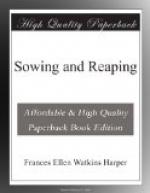“I am sorry,” said Belle as if speaking to herself, and her face had an absent look about it, as if instead of being interested in the living present she was grouping amid the ashes of the dead past. At length she said, “Mr. Clifford, permit me to say in the first place, let there be truth between us. If my heart seems callous and indifferent to your love, believe me it is warm to esteem and value you as a friend, I might almost say as a brother, for in sympathy of feeling and congeniality of disposition you are nearer to me than my own brother; but I do not think were I so inclined that it would be advisable for me to accept your hand without letting you know something of my past history. I told you a few moments since that I had my day dream. Permit me to tell you, for I think you are entitled to my confidence. The object of that day dream was Charles Romaine.”
“Charles Romaine!” and there was a tone of wonder in the voice, and a puzzled look on the face of Paul Clifford.
“Yes! Charles Romaine, not as you know him now, with the marks of dissipation on his once handsome face, but Charles Romaine, as I knew him when he stood upon the threshold of early manhood, the very incarnation of beauty, strength and grace. Not Charles Romaine with the blurred and bloated countenance, the staggering gait, the confused and vacant eye; but Charles Romaine as a young, handsome and talented lawyer, the pride of our village, the hope of his father and the joy of his mother; before whom the future was opening full of rich and rare promises. Need I tell you that when he sought my hand in preference to all the other girls in our village, that I gave him what I never can give to another, the first, deep love of my girlish heart. For nearly a whole year I wore his betrothal ring upon my finger, when I saw to my utter anguish and dismay that he was fast becoming a drunkard. Oh! Mr. Clifford if I could have saved him I would have taken blood from every vein and strength from every nerve. We met frequently at entertainments. I noticed time after time, the effects of the wine he had imbibed, upon his manner and conversation. At first I shrank from remonstrating with him, until the burden lay so heavy on my heart that I felt I must speak out, let the consequences be what they might. And so one evening I told him plainly and seriously my fears about his future. He laughed lightly and said my fears were unfounded; that I was nervous and giving away to idle fancies; that his father always had wine at the table, and that he had never seen him under the influence of liquor. Silenced, but not convinced, I watched his course with painful solicitude. All remonstrances on my part seemed thrown away; he always had the precedent of his father to plead in reply to my earnest entreaties. At last when remonstrances and entreaties seemed to be all in vain, I resolved to break the engagement. It may have been a harsh and hard alternative, but I would not




